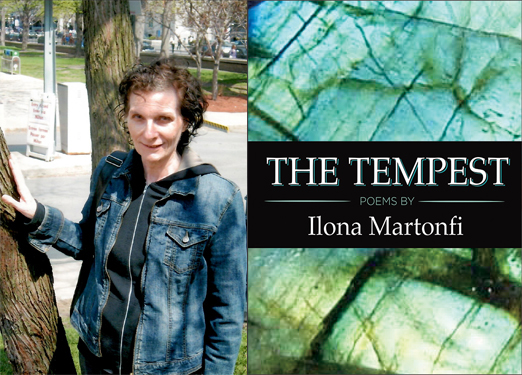Requiem
I have woven you this wide shroud out of humble words
I overheard you use. Everywhere, forever and always,
I will never forget one single thing.
Requiem by Anna Akhmatova
As Akhmatova states in a short prose preface to the work, Rekviem was conceived while she was standing in line before the central prison in Leningrad, popularly known as Kresty. Akhmatova dedicated the poem to the memory of all who shared her fate—who had seen loved ones dragged away in the middle of the night to be crushed by acts of torture and repression: “They led you away at dawn, / I followed you like a mourner. . . .”
Mixing various genres and styles, Akhmatova creates a striking mosaic of folk-song elements, popular mourning rituals, the Gospels, the odic tradition, and lyric poetry.
“I arrive here as if I’ve come home. / I’d like to name you all by name, but the list / Has been removed and there is nowhere else to look.“
— https://www.poetryfoundation.org › Poets
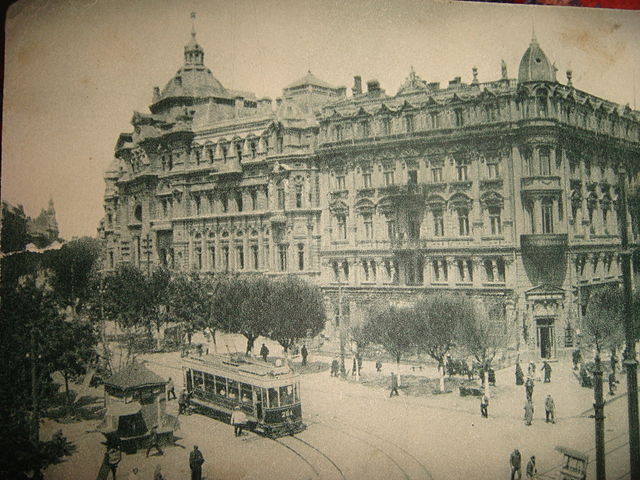
File:CP Odessa Dom Russova circa 1920s.JPG From Wikimedia Commons, the free media repository
In this Inanna blog Ilona Martonfi, author of The Snow Kimono, Salt Bride, and The Tempest introduces lyric poetry.Requiem. Kake kotoba, the pivot. Basho’s Haiku. Todesfuge. Rapunzel fairy tale. Offers a prose poem “The Orangery” from The Tempest.She will also introduce you to Klimt’s “Apple Tree”. Beethoven’s Symphony No. 9.Share the mental illness of her daughter.
Taking Turns in Haiku
“The Japanese device of kake kotoba, the pivot, is a word or phrase that combines with the foregoing text in one way and with the following text in another. Building a bridge between two images.”
inochi futatsu no / naka ni ikitaru / sakura kana
be tween our two lives / is the vivid life / of the cherry blossoms
by Matsuo Basho
—Wikipedia
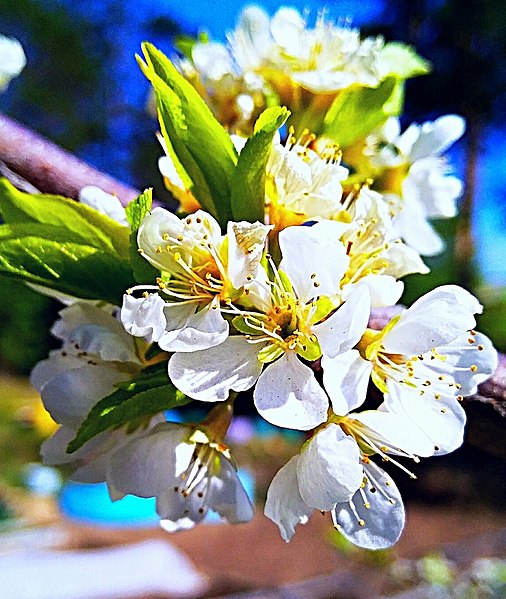
File:Cherry blossoms. Eastern Siberia.jpg From Wikimedia Commons, the free media repository
Advance Praise for The Tempest
“Words can be weapons, and Ilona Martonfi’s The Tempest isn’t afraid to wield them with a delicate and certain hand. It is difficult to put into words, the power of her work though I often find myself needing to take a long breath after each poem. The words resonant innate truths through the lens of other, mysterious worlds. And yet they’re more than that. Martonfi’s poetry reaches out of the page and demands the reader bear witness to the void, the sublime darkness. Deep trauma is interwoven with seemingly small and domestic moments in time and history that speak to the emotional landscape that underlies reality and the essence of the human experience.”
—Simone Pitot, singer, multi-instrumentalist and composer
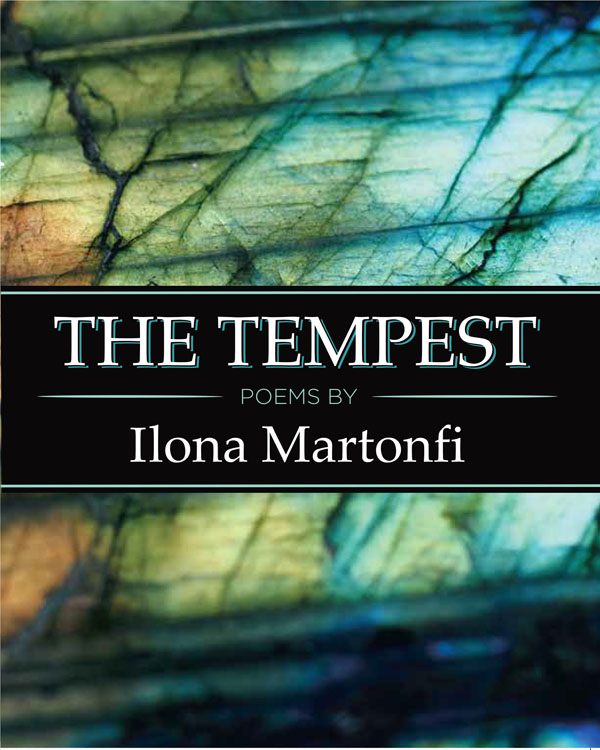
The Tempest – Inanna Publications www.inanna.ca
Your Book’s Key Features, Why it is Timely, Important
Martonfi’s evocative and vivid imagery of free verse, prose poetry, erasure poetry, haiku, and haibun, insist on the reader giving each word a lingering attention. Its wanderings in and out of forms signal its approach to some important obsessions — home and exile.
Divided into five parts, in a poem Section IV, page 55, “Lost,” she reflects on …exploring memory, forgetting…/ …The wolf hour… Populated by hybrid figures. Fantastic beasts. Metamorphosis and magic… Couldn’t seem to rid myself of any items that got lost, Christmas decorations, reels, oils… Anything. Also: everyone…/
Martonfi, too, seems invested in / …The red brick house with two apple trees. The silences… one divested from the violences of …Returning from violent earth water-damaged. The flooding. Impermanence and decay…/
—Inanna Author Questionnaire #28
Fugue definition
“In music, a fugue is a contrapuntal compositional technique in two or more voices, built on a subject (a musical theme) that is introduced at the beginning in imitation (repetition at different pitches) and which recurs frequently in the course of the composition. A fugue usually has three main sections: an exposition, a development and a final entry that contains the return of the subject in the fugue’s tonic key.”
—Wikipedia
Todesfuge by Paul Celan
“Each of the four sections begins with the image Schwarze Milch der Frühe which can be translated as “Black milk of dawn.” The speaking voice in the poem is a collective “We”. The structure of a musical fugue in that phrases are repeated and recombined. A death song that arises from the heart of a sufferer who longs for it. Here, the reference to death isn’t the normal one. It is the “living death” of those who suffered inside the concentration camps.”
—Wikipedia
Black milk of daybreak we drink it at evening
we drink it at midday and morning we drink it at night
we drink and we drink
we shovel a grave in the air there you won’t lie too cramped
A man lives in the house he plays with his vipers he writes
he writes when it grows dark to Deutschland your golden hair Margareta
(Translated by John Felstiner, in: Paul Celan – Poet, Survivor, Jew. New Haven 1995.)

File:Freight car, Auschwitz II-Birkenau, 2014.jpg From Wikimedia Commons, the free media repository
Prose Poetry definition
“Prose poetry is poetry written in prose form instead of verse form, while preserving poetic qualities such as heightened imagery, parataxis, and emotional effects. However, it makes use of poetic devices such as fragmentation, compression, repetition, rhyme, metaphor, and figures of speech.”
—Wikipedia
My offering a prose poem “The Orangery” page 58 from my new collection, The Tempest Inanna April, 2022. Previously published with Montreal Serai.
The Orangery
After I buried the umbilical cords, the placentas, the
cauls; after I moved in with the lemon trees and zinnias;
after I escaped his fists, I slept in the orangery on the
putty-coloured couch; after I saw the waning gibbous
and whirrs of mud swallows; after a Sicilian folk song
on a boombox: “Ciuri, Ciuri”; after I mopped ceramic
tiles with water and vinegar, painted cerulean the rush
chairs, the bunker kitchen, its black steel door: after
all that, I would take this verse and write sradicare,
uproot the wild roses, raspberry rhizomes, grasses.
And you’d ask: Why do you write verses about fetuses
and swallows, “Ciuri, Ciuri”? Flowers, Flowers.
Giambattista Basile’s Fairy Tale in 1634
Petrosinella
“The ogress takes Petrosinella by her hair and locks her in a tower deep in the woods with only a single window; the ogress relies on Petrosinella’s long hair to enter the tower. Within the tower, Petrosinella is taught “magic arts” by the ogress. One day, a prince sees her hair in the wind. Petrosinella noticing his passionate declarations of love blows him a kiss. Eventually, the prince makes his way to the tower and climbs up Petrosinella’s hair after he imitates the ogress’s voice.”
—Wikipedia
Under the Apple Tree
Song Of Solomon 8:5:
“Who is this coming up from the wilderness leaning on her beloved? She Under the apple tree I roused you; there your mother conceived you, there she who was in labor gave you birth.”
— https://biblehub.com › songs › 8-5
Music at our house in Anjou, the walls echoed with Beethoven’s Classical No. 9. Lilac skies and hot summer sun. The apple trees. The solarium in the walled garden. Scent of clay pot geraniums. A pine farm table. Six rush-seat chairs. Our four children. Artists, poets, and musicians.
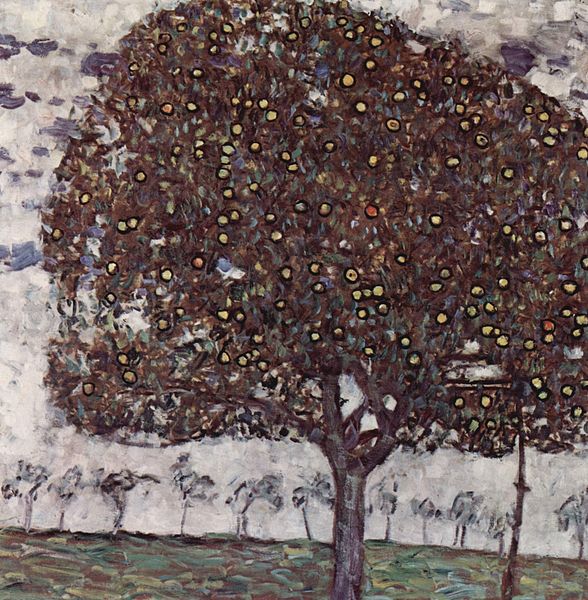
File:Gustav Klimt 013.jpg From Wikimedia Commons, the free media repository
Beethoven’s ‘Choral’ Symphony No. 9
Beethoven’s Symphony No. 9 in D minor, Op. 125, is regarded as one of his greatest compositions and one of the greatest symphonies ever composed. In the ‘Choral’ symphony, Beethoven took the structure of a Classical symphony to its limits in expression of his lofty philosophical theme: the unity of mankind and our place in the universe. As its final movement. It features four vocal soloists and a chorus who sing a setting of Schiller’s poem An Die Freude (Ode To Joy).
— Discover Beethoven’s ‘Choral’ Symphony No. 9 | uDiscover [www.udiscovermusic.com]
(Beethoven Symphony No. 9)
www.youtu.be/EGGaPfomg60
Mental Illness definition
“A mental illness is a behavioral or mental pattern that causes significant distress or impairment of personal functioning. Such features may be persistent, relapsing and remitting, or occur as single episodes. Many disorders have been described, with signs and symptoms that vary widely between specific disorders. Such disorders may be diagnosed by a mental health professional, usually a clinical psychologist or psychiatrist.”
—Wikipedia
Getting personal in my writing and baring my soul to my readers. Here I describe the effect chronic disease and mental illness had on my eldest daughter. Share a prose poem “The Facility” page 44 from The Tempest. Previously published with Soliloquies and Moth chapbook (Cactus Press, 2021).
The Facility
[…]
I created a shadow box. I went to cut lilacs in the walled garden.
Used a double key to get back in. I cut an old cloth-bound book
and put the blossoms into the book. By night I compiled a
dictionary: spaced out. Filthy. Lazy. Age thirty-three. As she
battles a chronic immune system disease, pulmonary sarcoidosis.
Fatigue. Dry cough. Melancholic depression. Hum of traffic on
Decarie Boulevard near Monkland Avenue. Codes for a locked
door. Daughter admitted for psychotic episode.
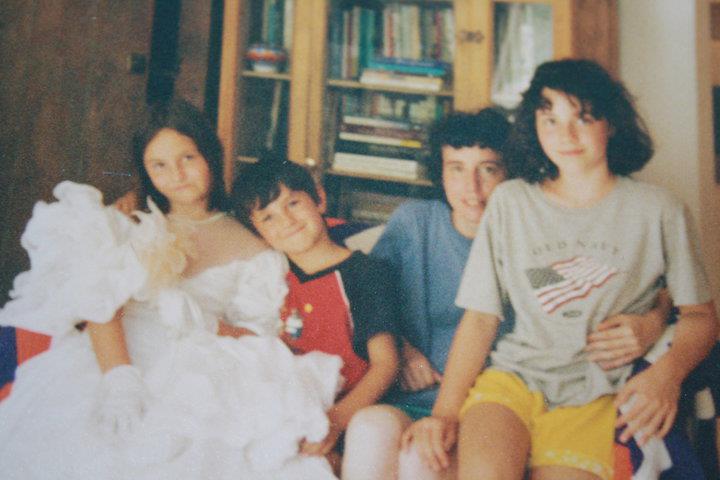
Marisa and her three children, Jessica, Matthew and Amanda Photo: Ilona Martonfi 2001
The Inanna Spring 2022 Catalogue is online: Please visit my book The Tempest p 11.
Inanna Catalogue:
https://www.inanna.ca › our-catalogues
All Lit Up features my Inanna books
https://alllitup.ca/contributors/M/Martonfi-Ilona
Most Anticipated: Our Spring 2022 Poetry Preview By 49thShelf Staff · most anticipated, poetry, poetry preview, spring 2022:
https://49thshelf.com/Blog/2022/02/28/Most-Anticipated-Our-Spring-2022-Poetry-Preview
Author bio: Ilona Martonfi is a Montreal poet born in Budapest. She is a writer, editor, creative writing teacher, and founder of the writing group, Rue Towers Writers. She is the author of the poetry books, Blue Poppy (2009), Black Grass (2012), The Snow Kimono (2015), and Salt Bride (2019), as well as seven chapbooks, Visiting the Ridge, Charivari, Magda, Adagio, Mud, Moth and Black Rain. Ilona is Founder and Literary Curator of The Yellow Door and Visual Arts Centre Reading Series and Argo Bookshop’s Reading Series. She is a recipient of the QWF 2010 Community Award. Ilona has published extensively in print and online literary publications. She was a Finalist for the 2007 Quebec Writing Competition. Her story, “My Daughter, Marisa,” was published in CBC Story Anthology III, In Other Words: New English Writing from Quebec (2008), and Ilona’s “Stories of Belonging” was shortlisted for Canada Writes in the adult category (2014). She was also a StepAway Magazine nominee for the 2018 Pushcart Prize for the poem “Dachau Visit on a Rainy Day”. The Tempest is her fifth poetry collection.

